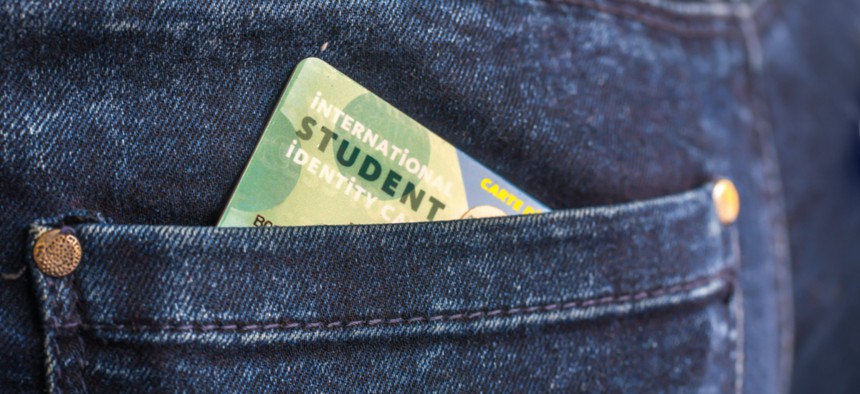State AGs Call on DHS to Withdraw Student Visa Rule Change Proposal

The AGs say the policy, proposed in September, could make it difficult for undergraduate students to complete their degrees. Shutterstock
The coalition of 22 state attorneys general objects to a proposed rule change that would place time limits on visas for foreign students and members of the media.
More than 20 state attorneys general are asking the Trump administration to withdraw a proposed rule that would restrict the amount of time that international students, exchange visitors and foreign members of the media are allowed to spend in the United States.
The proposal, released in March by the Department of Homeland Security, would establish a “fixed period of stay” of two to four years for international students and exchange visitors, with a renewal option. International media would be permitted to stay for a maximum of 240 days, with an opportunity to extend by an additional 240 days “based on the length of relevant activities.”
Under current policy, international students, exchange visitors and international reporters can stay in the country as long as they are in compliance with the terms of their individual visas. Federal officials said the rule change was necessary “in improving program oversight mechanisms, preventing foreign adversaries from exploiting the country’s education environment, and properly enforcing and strengthening U.S. immigration laws.”
The 22 state attorneys general disagreed, saying in a letter that the policy change was “fatally flawed,” rushed and potentially a violation of federal law.
“The proposed rule is arbitrary and capricious, and therefore cannot withstand scrutiny under the [Administrative Procedure Act] on several grounds, including faulty logic, defective data, and tenuous reasoning,” says the letter, sent Monday to acting Homeland Security Secretary Chad Wolf.
The coalition, led by Massachusetts Attorney General Maura Healey and District of Columbia Attorney General Karl Racine, said the terms of the proposed policy change are likely to discourage large numbers of international students from even applying for visas.
As written, the new rule would base visa time limits on whether a student comes from “a country on the State Sponsors of Terrorism list” and whether a school or program sponsor participants in E-Verify, a federal program that ensures that employees are eligible to work in the United States. Additionally, students from any of the 55 countries with “high visa overstay rates”—where more than 10% of visa recipients stay longer than permitted—will automatically be limited to two-year terms, designed to “increase monitoring, deter immigration violations and incentivize timely departure,” according to the Department of Homeland Security.
Because more than half of international students enroll in four-year bachelor-degree programs, the attorneys general said, those restrictions would likely discourage a large number of students from even applying to come to the U.S.
“Students subject to the two-year limitation, and, in some cases, the four-year limitation, would be applying for and enrolling in programs with no reasonable assurance that they will be permitted to complete them,” the letter said. “Given the risk involved, it is more than likely that significant numbers of students will not apply for those programs at all.”
In a statement, Racine said the policy would negatively impact enrollment at schools across the country, harming local and state economies and preventing thousands of students from completing their education.
“The Trump administration’s proposed rule to severely restrict time limits on international student visas is yet another xenophobic and unlawful attempt to keep foreign citizens out of the United States,” he said. “These students make important contributions to their schools and add millions of dollars to our local economy. Our coalition urges the Department of Homeland Security to abandon this drastic proposal because it could prevent many international students from finishing their degrees, drive down enrollment at American schools, and harm state economies.”
Kate Elizabeth Queram is a staff correspondent for Route Fifty and is based in Washington, D.C.
NEXT STORY: Americans living and serving overseas could tilt the 2020 election – if only they voted





